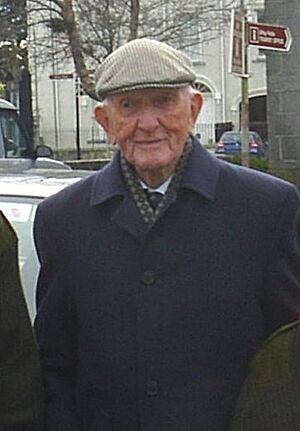Dan Keating facts for kids
Quick facts for kids
Dan Keating
|
|
|---|---|

Dan Keating in 2004
|
|
| Birth name | Daniel Keating |
| Nickname(s) | Dan |
| Born | 2 January 1902 Castlemaine, County Kerry, Ireland |
| Died | 2 October 2007 (aged 105) Knockbrack, County Kerry, Republic of Ireland |
| Allegiance | Irish Republican Army (IRA) Anti-Treaty IRA |
| Years of service | 1920–1939 |
| Rank | Volunteer |
| Battles/wars | Irish War of Independence Irish Civil War |
| Other work | Barman |
Daniel Keating (also known as Dónal Céitinn in Irish) was born on January 2, 1902. He was a strong believer in a united and independent Ireland throughout his life. He also served as a leader of the Republican Sinn Féin political party. When he passed away on October 2, 2007, he was the oldest man in Ireland. He was also the last person still alive who had fought in the Irish War of Independence.
Contents
Dan Keating's Early Life and Irish History
Dan Keating joined a youth group called Fianna Éireann in 1918. This group was connected to the Irish independence movement. In 1920, he joined the Irish Republican Army (IRA) during the Irish War of Independence. This war was fought to gain Ireland's freedom from British rule.
Fighting for Independence
Keating's first firearm was bought from a British soldier. He joined other Irish republicans near Tralee, including Johnny Connor. On April 21, 1921, a police officer was killed in Tralee. Keating and two others were suspected and had to go into hiding.
Later, on June 1, Keating was involved in an ambush between Castlemaine and Milltown. This event led to the deaths of five police officers. Just one day before a ceasefire between the IRA and British forces, Keating's unit was in a gun battle near Castleisland. Four British soldiers and five IRA volunteers died in this fight.
The Irish Civil War
After the War of Independence, the Anglo-Irish Treaty was signed in 1921. This treaty created the Irish Free State, but it also divided Ireland. Dan Keating was against this treaty. He fought on the side that opposed the treaty in the Irish Civil War.
He took part in actions in several counties, including Kerry, Limerick, and Tipperary. Eventually, his group was arrested by the Free State forces. Keating was held as a prisoner for seven months in Maryborough Gaol (now Portlaoise Prison) and the Curragh Camp. He was one of the last prisoners to be released in March 1924.
Later Republican Activities
In 1933, Keating was involved in a plan against Eoin O'Duffy, the leader of a political group called the Blueshirts. This plan was to happen at Ballyseedy, a place where a tragic event had occurred during the Civil War. However, the plan failed because they couldn't find out which car O'Duffy would be using.
Keating remained a member of the IRA for many years after the Civil War. He was arrested several times in the 1930s for his republican activities. In 1935, he was sentenced to 12 months in Mountjoy Prison.
He was also active in London during the S-Plan, which was an IRA campaign in 1939 and 1940. In January 1940, Keating led an IRA unit in London. This group carried out a series of actions in central London. Back in Ireland, Keating was arrested again in August 1940. He was held at the Curragh Camp until May 1944.
Later Years and Legacy
In 1944, Dan Keating married Dolly Fleming. After this, he moved back to Dublin and worked as a barman. In 1978, he retired and returned to his home county of Kerry. He lived the rest of his life with relatives in Knockbrack.
Keating never accepted a state pension from the government. He believed that the 26-county Republic of Ireland was not the true Irish Republic that he had fought for in 1916. He famously said, "All the talk you hear these days is of peace. But there will never be peace until the people of the 32 counties elect one parliament without British interference."
In 2002, he also refused a special €2,500 award given by the state to people who reached 100 years old. This award was offered by President Mary McAleese. After another former IRA volunteer, George Harrison, passed away in 2004, Keating became a patron (a supporter) of Republican Sinn Féin. By the time of his death, he was the oldest man in Ireland. He was buried in Kiltallagh cemetery near Castlemaine.
See also
- List of last living war veterans
 | Delilah Pierce |
 | Gordon Parks |
 | Augusta Savage |
 | Charles Ethan Porter |

